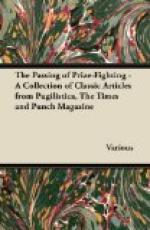* * * * *
Christine (MACMILLAN) contains a very illuminating picture of Germany in the months immediately preceding the War; but I am perplexed—and a little provoked—by the way in which it is presented. The book opens with a pathetic foreword, signed by Miss ALICE CHOLMONDELEY, in which we read: “My daughter Christine, who wrote me these letters, died at a hospital in Stuttgart on the morning of August 8th, 1914, of acute double pneumonia.... I am publishing the letters just as they came to me, leaving out nothing.... The war killed Christine, just as surely as if she had been a soldier in the trenches.... I never saw her again. I had a telegram saying she was dead. I tried to go to Stuttgart, but was turned back at the frontier.” Then follows a Publishers’ note to the effect that some personal names have been altered. After this one is naturally surprised to find the book advertised as a “new novel.” All I can say is that, if Miss CHOLMONDELEY’S preface is true, her book is not a novel, and that, if it is untrue, I do not think the foreword is fair or in good taste. My opinion, for what it is worth, is that Miss CHOLMONDELEY was herself in Germany during the summer of 1914, and has chosen this way of telling us what she saw and heard. Anyhow the letters are undoubtedly the work of someone who knows Germany and the inhabitants thereof. And for this excellent reason Christine should not be missed by anyone who wants to know in what a state of militant anticipation the Germans were living. The strongest searchlight has been thrown over the Hun, from the habitues of a middle-class boarding-house to members of the Junker breed. Whether these letters ought to be classed as fiction or not they contain facts, and as they are written in a style at once vivid and engaging my advice to you is to read them and not worry too much about the foreword.
* * * * *




